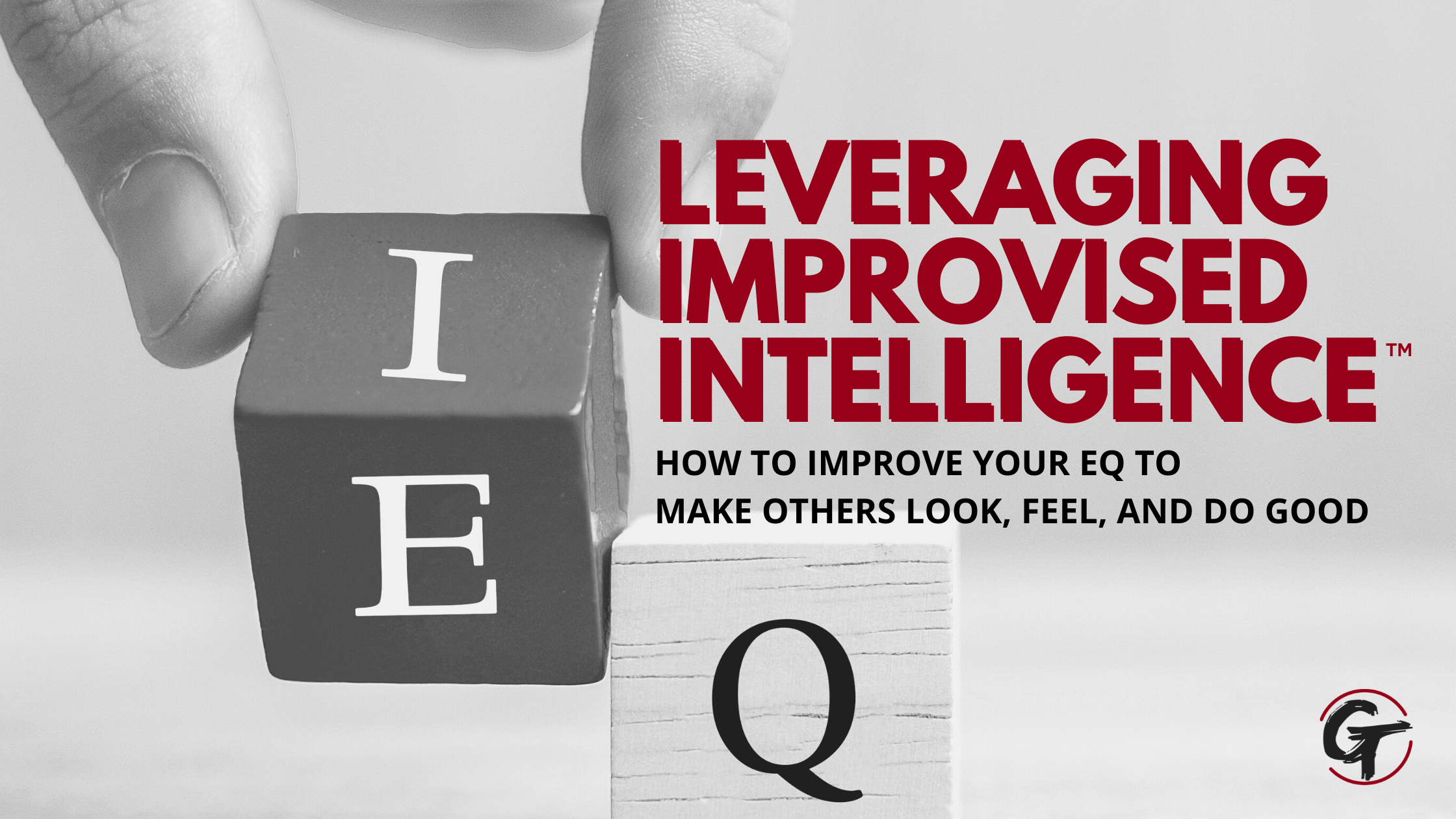You’ve heard of IQ. You may have also heard of EQ. Well, let me introduce IIQ – Improvised Intelligence™️.
My work in the area of and fascination with emotional intelligence inspired me to coin the phrase Improvised Intelligence™️. From Daniel Goleman’s EQ, to Dr. Travis Bradberry’s Emotional Intelligence 2.0, to Jeb Blount’s Sales EQ—the parallels between improv skills and emotional intelligence theory became really clear to me.
Emotional Intelligence (EQ) is defined as “the ability to identify and manage one’s own emotions, as well as the emotions of others. It generally includes the skills of emotional awareness (the ability to identify and name one’s own emotions), the ability to harness those emotions and apply them to tasks like thinking and problem solving and the ability to manage emotions, which includes both regulating one’s own emotions when necessary and helping others to do the same.”
Let’s unpack how this relates to improv.
On stage, as performers, we must be able to read our fellow performers, as well as the audience. The foundation of everything we do is our ability and intention to “make others look good.” In order to do that we need to be in tune, or in “group mind”, with others’ feelings and needs, while honoring the ideas of others, especially if they initiate ideas first.
Instead of becoming emotionally charged about forfeiting our uninitiated ideas, we focus on heightening our stage partners’ ideas. When we are “hyper-aware” and in the moment as performers. And we are more creative, agile and collaborative.
Everything boils down to self and social awareness in improv. This epiphany made it so easy for me to infuse improv exercises into EQ training content.
I’ll go into emotional intelligence in more detail in my article on Emoting and Empathizing where I share a story about the CEO who once said to me that “not everyone deserves empathy.”
Improv and Common Sense, Emotional Intelligence
For years I have felt that improv is a combination of innate ability, common sense and emotional intelligence. And for years, I took this skill set for granted because it seemingly came so easy to me, when really I’ve been practicing improv since I was 19 and this has improved both my common sense and EQ skills.
We were born to possess all of these, in my opinion. These abilities are steered by the brain which, as you know, is a muscle. If you don’t exercise a muscle, it loses its strength and ability.
When someone says to me “I could never get on stage like you do and just make up a show,” my response always is “Yes, you could. Everyone can. It just takes consistent practice.”
Everyone takes their abilities to improvise for granted. We assume our brain has it covered the way it does with breathing, motor skills, etc. and that it automatically helps us fight, fly, freeze and improvise (“freestyle”) because we’re wired for it.
Improvising is one of those activities that can definitely run on autopilot … AND if you put some effort into practicing improv, you will elevate your improv skills from status quo to superstar.
What is Improvised Intelligence?
My definition of Improvised Intelligence is “The ability to be a good human who makes others look and feel great for the good of all by exercising the brain to improvise.”
Emotional intelligence plays a part. Improvised Intelligence™️ provides the tools needed to improve emotional intelligence.
The #1 Rule (or Tenet) of Improv is: Make Others Look Good.
When we intentionally, unintentionally, or subconsciously, make others look good, we automatically look good. When we make others look bad, we look like jerks, which makes the whole group look or feel bad … or both.
Think about a work environment where a leader just sucks as a leader.
Let’s say he or she criticizes an employee in front of the group for an idea or suggestion.
The scenario could be as innocent as the leader saying, “Great idea Adam BUT we’ve tried that before and it just won’t work.”
First, that shuts down the employee by making them feel rejected by the big “but.” And I’m not talking about the butt who is saying “but,” even though that “butt” is responsible for the “but.”
Without discussion, the whole room can feel the disappointment or frustration of that team member. Many will absorb and inherit that frustration (emotion). Emotions are contagious.
- They may all start to feel different levels of emotion from “What an ass,” to “I’m happy I didn’t open my mouth.”
- They may become sympathetic to the person who put him or herself out there and make a note to not ever do that themselves. Positive energy turns into negative emotions.
- They might begin to dislike the leader while feeling sorry for the employee.
So much emotion can arise from the three-letter word “but.”
Overall, the potential of progress and innovation halts to a dead stop and the whole group loses and ultimately looks bad.
We are wired for the fear of rejection.
Jeb Blount talks about this in his book Objections. Being and feeling included matters. And in caveman days, it was essential to not be rejected by one’s tribe for the purpose of survival. The potential or fear of rejection will shut a person down and have repercussions on others.
Reverse that scenario. If the leader instead said, “That’s an interesting (or great idea) Adam. We’ve tried that in the past without success. AND maybe we could explore it again with your fresh eyes.” Replacing one negative three-letter word (“but”) with a positive three-letter word (“and”) can change a conversation AND a culture.
Be a Good Human
You don’t need a degree or special training to be a good human. If you want to be (and appear to be) intelligent, improvise by making others look and feel good. I’d say it’s a “no-brainer” to be a good human AND it clearly requires a strong brain!
The framework for Improvised Intelligence™️ revolves around this core foundation of making others look and feel great. There’s a simple layering system of core competencies that build upon each other.
Each of these competencies (or improv tenets) can stand on its own or be clustered as skillsets for training opportunities.
The natural progression for these tenets flows in the following order:
- Acceptance vs Agreement Without Judgement – The Power of “Yes, And”
- Active Communication: Listening and Observing
- Validate Others (and “Call Back”)
- Emote & Empathize
- Collaborate (Solve Problems & Innovate)
- Celebrate The Wins … Together
- Embrace and Solicit Failure (Be Vulnerable)
- Find The Funny (Relatability and In The Moment Personas)
- Find The “Game Of The Scene” (Behavioral Observations)




